Bios 251 week 1 lab - Study guides, Class notes & Summaries
Looking for the best study guides, study notes and summaries about Bios 251 week 1 lab? On this page you'll find 72 study documents about Bios 251 week 1 lab.
Page 3 out of 72 results
Sort by
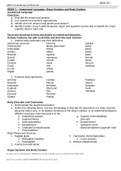
-
BIOS 251 Week 1 – 7 Anatomy Lab Terms List with Practice Pictures | Download To Score An A
- Other • 3 pages • 2022
- Available in package deal
-
- $14.49
- + learn more
BIOS 251 Anatomy Lab Term List WEEK 1 – Anatomical Language; Organ Systems and Body Cavities Anatomical Language Objectives: 1. Describe the anatomical position 2. Use anatomical directions appropriately 3. Identify and use various body planes and sections 4. Identify location of each abdominopelvic region and quadrant and be able to identify the major organ(s) deep to each one. Terms and structures to know and identify on models and dissection: Surface Anatomy: Be able to identify a...
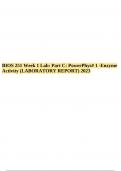
-
BIOS 251 Week 1 Lab: Part C: PowerPhys# 1 -Enzyme Activity (LABORATORY REPORT)
- Exam (elaborations) • 5 pages • 2023
-
- $7.19
- + learn more
Table 4: Effect of pH on Sucrase Activity Optical Density ph 3 ph 4 ph 5 ph 6 ph 7 ph 8 ph 9 1 0.150 0.323 0.667 0.926 0.824 0.431 0.186 2 0.190 0.321 0.675 0.955 0.810 0.431 0.168 3 0.173 0.293 0.650 0.958 0.776 0.438 0.147 average 0.171 0.312 0.664 0.946 0.803 0.433 0.167 Effect of pH on Sucrase Activity 1. State the optimum pH for sucrase activity and describe how sucrase activity changes at more acidic and more alkaline pH values. The optimum pH for sucrase is pH of 6 with optimal d...
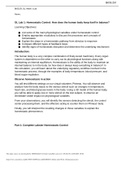
-
[SOLVED) BIOS 251 Week 1 Lab Assignment: Homeostatic Control: How does the human body keep itself in balance
- Exam (elaborations) • 5 pages • 2022
- Available in package deal
-
- $12.99
- + learn more
BIOS251 OL, Week 1 Lab Name: OL Lab 1: Homeostatic Control: How does the human body keep itself in balance? Learning Objectives: ● List some of the main physiological variables under homeostatic control ● Employ appropriate vocabulary to discuss the processes and concepts of homeostasis ● Explain the steps in a homeostatic pathway from stimulus to response ● Compare different types of feedback loops ● Identify signs of homeostatic disruption and determine the underlying mechan...
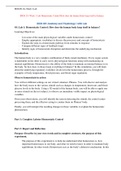
-
BIOS 251/BIOS251 Anatomy and Physiology I with Lab Week 1 Lab: Homeostatic Control: How does the human body keep itself in balance (2022/2023)
- Presentation • 4 pages • 2022
-
- $15.49
- + learn more
BIOS 251/BIOS251 Anatomy and Physiology I with Lab Week 1 Lab: Homeostatic Control: How does the human body keep itself in balance (2022/2023)
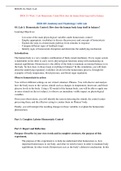
-
BIOS 251/BIOS251 Anatomy and Physiology I with Lab Week 1 Lab: Homeostatic Control: How does the human body keep itself in balance (2022/2023)
- Presentation • 4 pages • 2022
-
- $15.49
- + learn more
BIOS 251/BIOS251 Anatomy and Physiology I with Lab Week 1 Lab: Homeostatic Control: How does the human body keep itself in balance (2022/2023)
BIOS 251/BIOS251 Anatomy and Physiology I with Lab Week 1 Case Study: Homeostasis (Latest, 2022/2023)
BIOS 251/BIOS251 Anatomy and Physiology I with Lab Week 1 Case Study: Homeostasis (Latest, 2022/2023)
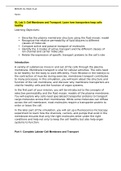
-
BIOS 251 Week 3 Lab: Cell Membrane and Transport-Learn how transporters keep cells healthy
- Exam (elaborations) • 6 pages • 2022
- Available in package deal
-
- $9.99
- + learn more
BIOS 251 Week 3 Lab: Cell Membrane and Transport-Learn how transporters keep cells healthy Learning Objectives: Describe the plasma membrane structure using the fluid mosaic model Recognize the relative permeability of lipid bilayers to different classes of molecule Compare active and passive transport of molecules Identify the 3 modes of active transport and the different classes of ion channel and carrier molecules Relate the expression of specific transport proteins to the cell’s ...
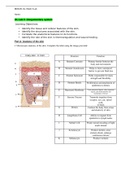
-
BIOS 251 Week 5 Lab-Integumentary System
- Other • 8 pages • 2022
- Available in package deal
-
- $13.99
- + learn more
BIOS 251 Week 5 Lab-Integumentary System OL Lab 5: Integumentary system Learning Objectives: Identify the tissue and cellular features of the skin. Identify the structures associated with the skin. Correlate the anatomical features to its functions. Identify the role of the skin in thermoregulation and wound healing. Part A: Anatomy of the skin Microscopic anatomy of the skin. Complete the table using the image provided: Gross anatomy of the skin. Complete the table using the image ...
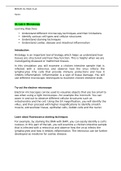
-
BIOS 251 Week 4 Lab-Microscopy
- Exam (elaborations) • 5 pages • 2022
- Available in package deal
-
- $9.99
- + learn more
BIOS 251 Week 4 Lab-Microscopy Learning Objectives: Understand different microscopy techniques and their limitations Identify various cell types and cellular structures Understand staining techniques Understand coeliac disease and intestinal inflammation Introduction: Histology is an important tool of biology which helps us understand how tissues are structured and how they function. This is helpful when we are investigating diseased or malformed tissues. In this simulation you wil...

$6.50 for your textbook summary multiplied by 100 fellow students... Do the math: that's a lot of money! Don't be a thief of your own wallet and start uploading yours now. Discover all about earning on Stuvia




